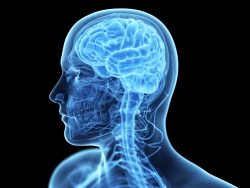
Lie: I am my brain.
Truth: I fluently exercise my brain.
The three-pound organ that crowns our heads and sits behind our faces, is a living wonder. Today, it’s the object of an extraordinary amount of scientific research that is probing to discover how this small, whitish, cheese-like substance could create the grand mystery of consciousness.
And while biologists try to understand its workings, computer scientists try to reverse-engineer its billions of neurons and synapses and ‘wiring.’
Ray Kurzweil, transhumanist, inventor and author, in his book, The Singularity is Near, estimates that computers will be able to reach parity with the brain’s raw processing power during the decade of the 2020s, that is, computers will be able to pass the Turing Test, achieving the first true strong artificial intelligence (AI). Yes, even in the age of supercomputers, the brain simply out-performs every existing computer in terms of its parallel processing – that is, the ability to process in real time, the massive amount of ‘data’ constantly being received by our senses. And it does this silently and quite effortlessly.
It’s apparently true that the brain profoundly affects practically all aspects of our lives, including our personality, our character, our bodily functions and our ability to relate, think and communicate. Anyone whose brain is damaged either through disease, injury or neglect could lose all ability and become ‘brain-dead.’ The sheer power and majesty of the brain’s control over our whole being is apparently so complete that it’s easy to assume that the visible/material brain is the sum total of that power. No other organ comes close to the scope of its prowess. But the question remains: is it simply the material brain that creates our consciousness and abilities, or is the brain the elaborate ‘wiring’ for something deeper?
But for a moment let’s imagine that I am nothing more than my brain. What if there was nothing deeper, as we’re told? This is what it would mean: it means that the sum of all my emotions, all reason, all relationships, all experience, amounts to nothing more than the electro- and biochemical processes of my brain. In other words, the brain functions as a grand illusionist (or delusionist) and puts on quite a show for us. But the ‘show’ would actually turn out to be meaningless. So the love that we think we feel is really not love, it’s simply the brain creating a signal pattern that we interpret to be ‘love.’ The thought that I compose here in these words now, is actually not a ‘thought,’ it’s only a different signaling pattern of the same brain – but it really means nothing.
This grand illusion of consciousness – if it is that – is, of course, universal and practically ‘required.’ It’s irreversible, that is, we cannot not experience the grand illusion. In other words we cannot turn the illusion off and simply be, what would be ‘ourselves,’ that is, just our brain.
This should tell us something. It should tell us that a soul, the real person who animates the brain and somehow uses the brain as a complex instrument, in turn, animates us in the physical world. To move, to see, to hear, vocalize and a thousand other actions allowing us to function on earth is only because the soul and brain – actually the entire physical body – are designed as an integrated whole and are inseparable except in death. Death is th e separation, the tearing of the soul from the body. Without the soul, the body, including the brain, is limp and lifeless. And this is a fitting commentary on the ‘I am my brain’ meme. It means that, in death, we can no longer interact with the physical world as God designed us. Without the brain and soul connected, we cannot function in the real world.
e separation, the tearing of the soul from the body. Without the soul, the body, including the brain, is limp and lifeless. And this is a fitting commentary on the ‘I am my brain’ meme. It means that, in death, we can no longer interact with the physical world as God designed us. Without the brain and soul connected, we cannot function in the real world.
Most scientists today, at least publicly, argue for a purely material universe. But this claim produces a thorny problem for these ‘physicalists.’ The problem that it creates is the ‘mind-body problem’ and in particular, what has come to be known as the ‘Hard Problem of Consciousness.’ In this problem some of these physicalists bravely try to confront the problem head on. Here is philosopher David Chalmers in his own words describing the problem:
It is undeniable that some organisms are subjects of experience. But the question of how it is that these systems are subjects of experience is perplexing. Why is it that when our cognitive systems engage in visual and auditory information-processing, we have visual or auditory experience: the quality of deep blue, the sensation of middle C? How can we explain why there is something it is like to entertain a mental image, or to experience an emotion? It is widely agreed that experience arises from a physical basis, but we have no good explanation of why and how it so arises. Why should physical processing give rise to a rich inner life at all? It seems objectively unreasonable that it should, and yet it does. . . . The really hard problem of consciousness is the problem of experience. When we think and perceive there is a whir of information processing, but there is also a subjective aspect.[1] [emphasis mine]
He and others have worked hard to try to solve the problem, some by arguing for consciousness being a fundamental element of the universe; and others by entirely dismissing the problem by saying that science, if we’re patient, will eventually explain it all. Others, such as Colin McGinn, have essentially given up and said that our mind in its current form, will not be able to explain consciousness, and ends up capitulating to what has been named the New Mysterianism, which ironically sounds like the beginnings of a new religion.
The mind-body ‘problem’ was recognized and formulated as early as 1641 by Rene Descartes and has persisted essentially unchanged and unsolved to this day. The persistence of the problem is telling. Could it be that God has placed the evidence for a spiritual world right under (behind) our noses? Yes, I think so.
We as Christians don’t claim to understand how specifically the mind – and our soul – interacts with our brain, but we don’t have to. We just need to know that we are more than our brain.
[1] David Chalmers (1995). “Facing Up to the Problem of Consciousness””. Journal of Consciousness Studies 2 (3): 200–219.